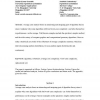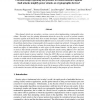291 search results - page 2 / 59 » How Well Can Primal-Dual and Local-Ratio Algorithms Perform |
CDC
2010
IEEE
13 years 6 days ago
2010
IEEE
Abstract-We study the well known linear consensus algorithm by means of a LQ-type performance cost. We want to understand how the communication topology influences this algorithm. ...
AMC
2007
13 years 5 months ago
2007
: Average case analysis forms an interesting and intriguing part of algorithm theory since it explains why some algorithms with bad worst-case complexity can better themselves in p...
DFT
2008
IEEE
13 years 7 months ago
2008
IEEE
Side-channel attacks are nowadays a serious concern when implementing cryptographic algorithms. Powerful ways for gaining information about the secret key as well as various count...
DSN
2007
IEEE
13 years 11 months ago
2007
IEEE
When employing a consensus algorithm for state machine replication, should one optimize for the case that all communication links are usually timely, or for fewer timely links? Do...
TPDS
2008
13 years 5 months ago
2008
When employing a consensus algorithm for state machine replication, should one optimize for the case that all communication links are usually timely, or for fewer timely links? Do...


